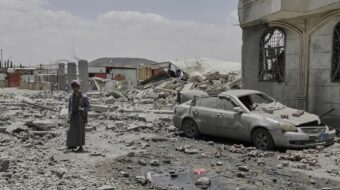Last week’s G20 meeting — of leaders of the world’s big and developing economies — sparked a Facebook conversation between Toby Chaudhuri of the Campaign for America’s Future and Vijay Prashad, who teaches international studies at Trinity College in Hartford, Conn. We enjoyed their back-and-forth and they kindly agreed to share it with PWW readers.
Toby Chaudhuri: The G20’s added global stimulus is dramatic and vitally needed, but leaders decided to let the crisis decide if more steps are necessary.
Vijay Prashad: Dramatic? Tax havens, CEO compensation, and a mild reassessment of the IMF….
Remarkable that the U.S.-European Union come as debtor countries and are yet treated as the powerful ones. China, India, the sovereign funds, the rest of the G-77, etc. — they still can’t determine the rules! Why not cancel all global debt obligations that stem from the Volker high interest rate regime of the 1980s, and then talk?
Bailout for AIG, but not for the bulk of the African, Asian and Latin American economies….
For shame!
Chaudhuri: We need more blood in the economy. The G20 agreement on resources — over $1 trillion — for the developing world in this crisis was a dramatic and vitally needed initiative. Otherwise, the G20 chose to agree to agree. The Europeans avoided bold new stimulus commitments. The British and Americans avoided bold new regulation of the financial community. Clearly the leaders decided to let the crisis decide whether new steps are necessary.
Prashad: What do we mean, ‘we,’ kemo sabe? The so-called ‘developing countries’ are stuck with a debt of over $3 trillion, with debt servicing now close to $600 billion per year — this is the great global accumulation by dispossession. If that money, since the 1980s, had been deposited in a Global Bank of the South, and if that capital had been used to build infrastructure in the South, (a) so much capital would not have come Northward, to flush the stock markets, and (b) much good could have come in terms of social development. And more, the ‘more blood’ now being put into the economy is being used by the big banks to consolidate their own power in the shrinking banking market (they are increasingly buying each other up): they are using taxpayer money to consolidate their own class power…. Not a process that will be good for the people in the long run.
Or so I think….
Chaudhuri: No question, chief. There’s much work to be done. The inequality gap is growing more and more stressed by unsustainable trade imbalances. We have to put the world on notice that the old ways are gone. We can’t go back to an economy in which the U.S. borrows $2 billion a day from abroad, while serving as the world’s consumer of last resort either. The Chinese, Japanese, Germans and other nations have to move away from export-led growth. The unsustainable trade imbalances — with the U.S. absorbing 70 percent of the world’s savings — provided the flood of cheap capital that eventually capsized the global economy. That world is over.
Prashad: I’m with you. In lieu of the peanuts on your upcoming flight to Chicago, I would be happy to send you the recommendation paper from the UN Expert Commission on the financial crisis (chaired by Joseph Stiglitz, who’d have made a super Treasury Sec).
Chaudhuri: The is a great read. Thanks for passing it on. Stiglitz’s fingerprints are throughout. The Preamble’s first point sets the stage well, ‘The rapid spread of financial crisis from a small number of developed countries to engulf the global economy provides tangible evidence that the international trade and financial system needs to be profoundly reformed to meet the needs and changed conditions of the 21st century.’ One can hear the music playing — the old way is over and the fight for the new system has begun.









